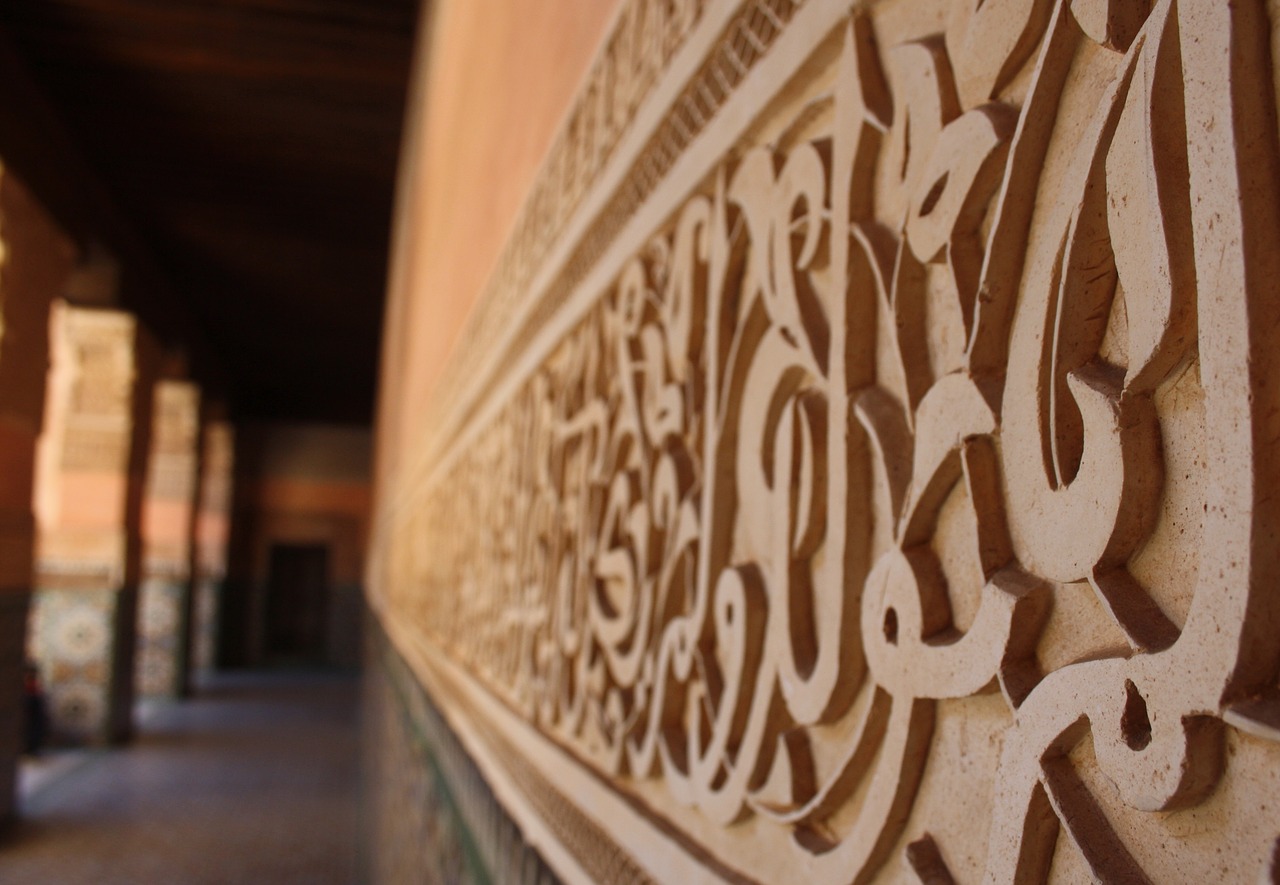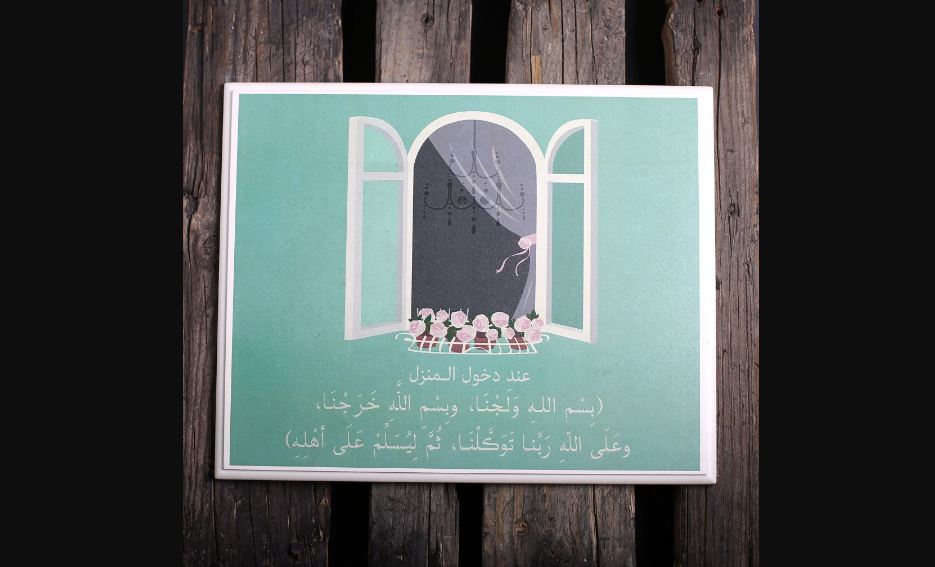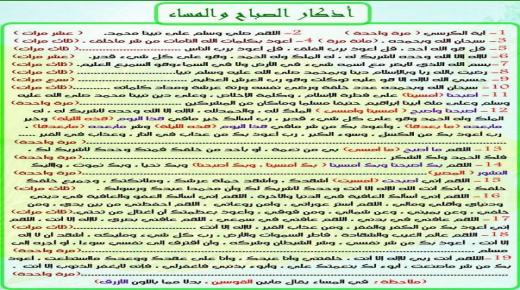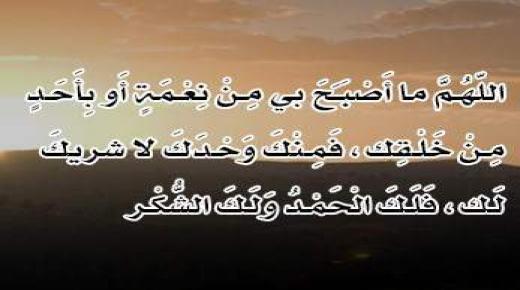
In the daily remembrances and occupying the tongue with it to protect it from falling into the scourges of the tongue, the tongue that does not remember its Lord will speak idle words, and may be preoccupied with mentioning people’s faults or lying or backbiting and gossip.
Daily Azkar
On the authority of Anas (may God be pleased with him), on the authority of the Prophet (may God’s prayers and peace be upon him), in what he narrated on the authority of his Lord (Glory be to Him), he said: “If a servant draws near to Me by a span, I draw near to him by a cubit, and if he draws near to Me by a cubit, I draw near to him by a length, and if he comes to Me walking, I come to him at a trot.” . Narrated by Al-Bukhari.
And the closest acts of worship to God’s love, the greatest of them in reward, and the easiest of them to do is the worship of the dhikr. Spending gold and silver is better for you than if you meet your enemy and strike their necks and they strike yours?” They said: “Yes, O Messenger of God!” He said: “Remembrance of God (the Exalted and Majestic).” Sunan al-Tirmidhi.
How not?! It is he (may God bless him and grant him peace) who advised the questioner who complained that he could not do all the laws of Islam, so he advised him to always remember God. On the authority of Abdullah bin Busr (may God be pleased with him), he said (When the man complained about his condition, he said: O Messenger of God! The rituals of Islam have multiplied for me, so tell me something to cling to (hold on to), he said: Your tongue is still moist from the remembrance of God) Narrated by Al-Tirmidhi and authenticated by Al-Albani.
By the remembrance of God, you make up for your shortcomings in what you missed, and you realize those who preceded you, and by the remembrance of God, you surpass those who come after you in reward, because when the poor complained about their condition to the Prophet (may God bless him and grant him peace), they complained of hardship; They are not able to give alms, Hajj, Umrah, jihad, etc., and they did not complain about the lack of money seeking the world, but rather because the lack of money hinders them from good deeds that need money, and they told him that the rich excelled them in good deeds and in collecting wages, so what did the Prophet advise them to catch up with them in reward? ? And even before them? He advised them to remember God and told them that they could also enter the door of alms through dhikr.
فعنْ أَبِي ذَرٍّ (رضى الله عنه)، أَنَّ نَاسًا مِنْ أَصْحَابِ النَّبِيِّ (صلى الله عليه وسلم) قَالُوا لِلنَّبِيِّ (صلى الله عليه وسلم): يَا رَسُولَ اللهِ، ذَهَبَ أَهْلُ الدُّثُورِ بِالْأُجُورِ، يُصَلُّونَ كَمَا نُصلى، وَيَصُومُونَ كَمَا نَصُومُ، وَيَتَصَدَّقُونَ بِفُضُولِ أَمْوَالِهِمْ، He said: Has God not made for you what you give as alms? إِنَّ بِكُلِّ تَسْبِيحَةٍ صَدَقَةً، وَكُلِّ تَكْبِيرَةٍ صَدَقَةً، وَكُلِّ تَحْمِيدَةٍ صَدَقَةً، وَكُلِّ تَهْلِيلَةٍ صَدَقَةً، وَأَمْرٌ بِالْمَعْرُوفِ صَدَقَةٌ، وَنَهْيٌ عَنْ مُنْكَرٍ صَدَقَةٌ، وَفِي بُضْعِ أَحَدِكُمْ صَدَقَةٌ، قَالُوا: يَا رَسُولَ اللهِ، أَيَأتِي أَحَدُنَا شَهْوَتَهُ وَيَكُونُ لَهُ فِيهَا أَجْرٌ؟ He said: Have you seen that if he were to devote it to something unlawful, he would be sinning for it? So if he does it in a halaal him pay.
Tell them that the door of charitable giving is wide open for them through the remembrance of God (Almighty and Majestic), so the tasbihah is saying “Glory be to God,” and the takbeerah is saying “Praise be to God,” and the takbeer is saying “God is great,” and the tahlilah is saying “there is no god but God.” Every one of them with a reward is charitable, like someone who gives his money completely in charity. Rather, every good word in which you command others to do good or forbid them from evil is charitable, for this is a door to good that is never closed.
And the remembrance of God is the fortress or refuge by which a person takes refuge from all evils, and even secures himself in it from all the fears that frighten him. children of Israel and said:
“God commanded Yahya bin Zakariyya with five words to act upon, and He commanded the Children of Israel to act upon them, and he was slow. Jesus said: God commanded you to follow five words, and you commanded the Children of Israel to act by them. , Yahya said: I fear that if you precede me with it, I will be swallowed up or I will be punished. So the people gathered in Bayt al-Maqdis, so the mosque was filled with chandeliers, and they sat down. A: Indeed, God commanded me with five words to act upon, and I command you to act upon them.
فكان من الأوامر الخمسة الوصية والأمر بذكر الله، وأنه هو الحصن الذي يحتمي به المؤمن، فقال: “وَآمُرُكُمْ أَنْ تَذْكُرُوا اللَّهَ فَإِنَّ مَثَلَ ذَلِكَ كَمَثَلِ رَجُلٍ خَرَجَ الْعَدُوُّ فِى أَثَرِهِ سِرَاعًا حَتَّى إِذَا أَتَى عَلَى حِصْنٍ حَصِينٍ فَأَحْرَزَ نَفْسَهُ مِنْهُمْ، كَذَلِكَ الْعَبْدُ لاَ يُحْرِزُ نَفْسَهُ مِنَ Shaitan, except in the remembrance of Allah.” So, remembering Allah is a fortress that the believer enters to take refuge in it from his first enemy, which is Satan.
What is the virtue of daily dhikr?
If you want to imagine a day in the life of the Prophet Muhammad (may God bless him and grant him peace), you will find that he did not stop mentioning God in every situation and in every moment. The hadith scholars investigated it and found that he (may God bless him and grant him peace) was in constant remembrance from the time he opened his eyes in the morning until he closed them at night, and slept to the extent that his wives, the mothers of the believers, told us that he used to remember God if he turned over during his sleep, to assure us of this fact that there was no moment he was The tongue of the Messenger of God stops mentioning.
And the Prophet (peace and blessings of God be upon him) keenness on the supplications confirms their great virtue, especially since the Muslim’s capital in this world is the moments he lives, and that he must invest his time in collecting the highest wages, because life is short and we must use it in obedience to God, today he is work without reckoning. And in the near future it will be an account without work.
Every word he utters has its value. A servant may say a word whose value he does not appreciate, and he does not think it is effective, and it may be great in the eyes of God. On the other hand, he may say a word that he does not care about and in it will be his salvation and the pleasure of his Lord upon him. On the authority of Abu Abd al-Rahman Bilal ibn al-Harith al-Muzani (may God be pleased with him). On his authority) that the Messenger of God (may God’s prayers and peace be upon him) said: “A man utters a word with the pleasure of God Almighty. He did not think that it would reach what it did. God records for him His satisfaction with it.” Until the day he meets him, and the man will speak a word out of God’s displeasure no matter what. He thinks that she will attain what she has attained, and God will record for him his wrath with her until the day he meets him.” Narrated by Malik and Al-Tirmidhi.
And may God have mercy on the poet Abd al-Rahman al-Sharqawi when he said about the importance of the word: “The word is light, and some words are graves, the word guides the world, the word shakes the oppressor, the word is the fortress of freedom, the word is a responsibility, the man is the word.”
And the best word spoken by the believer is what he mentions his Lord, in fact the best words said by our master Muhammad and the prophets before him is the remembrance of God. There is no god but Allah alone, He has no partner, His is the kingdom and His is the praise, and He is capable of everything.” Narrated by Imam Malik in Al Muwatta’.
The best daily dhikr

There is no doubt that the daily remembrances are all beneficial because they are the solid bond that connects the servant and his Lord. In them, the servant seeks the help of his Lord to facilitate his affairs and the affairs that he intends to do. Therefore, one of the best daily remembrances is obligating the tongue to begin with the name of God (blessed and exalted be He) before anything.
On the authority of Abu Hurairah, who raised it to the Messenger of God (peace and blessings of God be upon him): “Every important matter that does not begin with the praise of God is cut off.” Narrated by Abu Dawud and Ibn Majah, meaning that it is an incomplete, cut-off work that does not bear fruit and has no value. He said: “He is cut off, cut off, annihilated from every blessing.”
That is, the blessing is cut off from it because it did not include and did not begin with the remembrance of God, with whose remembrance He blesses every action and with the remembrance of His name.
- At the beginning of your food, according to what the Prophet (may God bless him and grant him peace) said to Umar ibn Abi Salamah: “Oh boy, name God and eat with your right hand.” Agreed upon.
- When you enter your house, according to the hadith narrated by Jabir, he (may God’s prayers and peace be upon him) said: “If a man enters his house, and remembers God when he enters and when he eats, Satan says, ‘There is no place for you to spend the night or have dinner.’” narrated by Muslim.
- When you perform ablution for prayer and other than prayer, according to the hadith narrated by Huraira on the authority of the Prophet (may God bless him and grant him peace): “There is no ablution for the one who does not mention the name of God over him.” Narrated by Abu Dawood.
- When it is slaughtered for sacrifice, sacrifice, or for every slaughtered animal to make its food delicious when slaughtered: according to the hadith narrated by Rafi’ ibn Khadij on the authority of the Prophet (may God’s prayers and peace be upon him): “Whenever blood flows and the name of God is mentioned over it, then eat.” agreed.
- When you have intercourse with your wife, and the wife also says it at the beginning of intercourse, for the hadith narrated by Ibn Abbas (may God be pleased with them both) on the authority of the Prophet (may God bless him and grant him peace) that he said: “If one of you says when he comes to his family: In the name of God, O God, save us from Satan and Satan, what Our sustenance, for if a child is conceived between them, Satan will never harm him.” Agreed upon.
- When riding animals, which is transportation today, whoever rides a car or a train or other than that, let him start with the name of God, because of His saying (the Most High):
- We conclude the life of a Muslim with it, so that it will be the last thing he hears in this world. When the mourners place the dead in his grave, they say “In the name of God” and this is in implementation of the hadith narrated by Ibn Omar (may God be pleased with them both) on the authority of the Prophet (may God bless him and grant him peace): “If you place your dead in your graves, then say, In the name of God and on the religion of the Messenger of God (may God bless him and grant him peace). and peace)”, narrated by Ahmed.
In short, all the actions that a Muslim performs must begin with the name of God, so when falling from the animal and when sick when he puts his hand on the place of pain and when leaving the house, and in the morning and evening remembrances, and even when you enter the toilet until you cover your private parts from the jinn, you say in the name of God .
This is what was narrated on the authority of the Prophet (may God bless him and grant him peace): “Covering what is between the eyes of the jinn and the private parts of the sons of Adam, if one of them enters the cell to say in the name of God.” Narrated by Al-Tirmidhi.
Remembrance of waking up from sleep
The awakening of a person from his sleep is divided into two types:
section One: A temporary awakening, such as tossing and turning in his sleep, then waking up for a few moments, then falling asleep again.
In it, the Messenger of God (may God’s prayers and peace be upon him), who would not leave a moment of awakening without mentioning God during it, taught us a supplication to pray. On the authority of Ubadah ibn al-Samit, the Prophet (may God’s prayers and peace be upon him) said: “Whoever feels tired during the night and says when he wakes up: There is no god but God alone, with no partner to Him. To Him belongs dominion and to Him is praise, and He is capable of all things. Glory be to God, praise be to God, there is no god but God, and God is great, and there is no power nor strength except in God, the Most High, the Great.” Then he called: “O God, forgive me, forgive him.” Al-Walid said: Or he said: “His supplication will be answered, and if he gets up and performs ablution and then prays, his prayer will be accepted.” Narrated by Al-Bukhari and Ibn Majah, and the pronunciation is his.
Al-Ta'arar is being awake at night, and it is also staying up late, lying down and tossing and turning in bed at night with the ability to pay attention and speak, as explained by Ibn Hajar in Al-Fath.
Section Two: It is waking up from sleep and doing daily work. The Messenger (may God bless him and grant him peace) taught us supplications, including:
- To say this supplication that was mentioned by Hudhayfah bin Al-Yaman (may God be pleased with them both) and Abu Dharr (may God be pleased with him). They said: When the Messenger of God (may God bless him and grant him peace) went to bed, he would say: “In your name, O God, I live and die,” and when he woke up, he would say “Praise be to God who brought us back to life after He caused us to die, and to Him is the resurrection.” Sahih Bukhari
- We say: “Praise be to God who healed me in my body, restored my soul, and permitted me to remember Him.” Sahih Sunan al-Tirmidhi.
And there is nothing wrong with a person saying some or all of them, and he should be careful that they are the first things that his tongue utters, so that these words are the first things that the angels write in his newspaper at the beginning of the day, so that this righteous servant begins his day with the remembrance of God and ends it - God willing - with a remembrance. The book of his day reaches his Lord, beginning and ending with the remembrance of God.
Remembrances for entering the toilet (bathroom)
If a Muslim wakes up and starts his day, it is better for him to start his day by entering the toilet (bathroom) so that he can get rid of harm and rest, and there is a mention of entering the toilet that the Messenger (may God bless him and grant him peace) taught us. (May God bless him and grant him peace) used to say when entering the toilet: (O God, I seek refuge in You from wickedness and wickedness).
There were many interpretations of the scholars about the words “maliciousness and malice.” Some of them said that seeking refuge from the origin of malice is the silence of the baa. That is, malicious actions, and some of them said that wickedness includes the addition of the baa’; That is, the males of the jinn, and the malicious females.
This supplication is said before entering the bathrooms in the houses and when standing in the place where the need is performed in the desert or in the open land.
It came on the authority of Zaid bin Arqam (may God be pleased with him) that the Messenger of God (may God bless him and grant him peace) said: “This crowd is dying, so if one of you comes to the toilet, let him say: “I seek refuge in God from wickedness and wickedness.” Narrated by Abu Dawud, Ibn Majah and Ahmad, and authenticated by Al-Albani.
And the meaning of crowds is the places where the need is fulfilled, and the word dying means that the demons of the jinn abound in them because of their love for filth, so it was sought refuge from them.
And the remembrance of God is forbidden in these places to preserve the name of God in being mentioned in this place full of impurities, so if a Muslim sneezes, he does not praise God with his loud voice, but rather praises Him secretly, and if someone greets him, he does not return the peace so that he does not return the name of God, and likewise if he hears the muezzin He does not repeat behind him except in secret, and he does not speak except for an extreme necessity such as alerting a Muslim of danger that befalls him, and so on.
Abdullah Ibn Omar - may God Almighty be pleased with them both - narrated: (A man passed by the Prophet - may God’s prayers and peace be upon him - while he was urinating, so he greeted him, but he did not respond to him) Narrated by Muslim in his Sahih, and also on the authority of Al-Muhajir bin Qunfuth (may God be pleased with him) who said: “I came to the Prophet (may God bless him and grant him peace) while he was urinating, so I greeted him, but he did not respond until he performed ablution, then he apologized to me and said: (I hated to mention God (the Almighty) except on a state of purity)” or he said: “on a state of purity.” An-Nawawi mentioned it in Adhkaar .
Likewise, he hates all speech in general while relieving oneself, so there is no sharing in the bathrooms, nor in the open, nor talking until a person comes out of the bathroom or finishes relieving himself, and it is better to hurry to it because it is a place where impurities gather, so a Muslim should fulfill his needs and leave the place.
Remembrance of getting out of the bathroom
If a person has finished relieving himself, he should go out or leave the place where he relieves himself if he is in the open, and it is recommended for him to say this supplication, then say “Your forgiveness,” meaning he asks God for forgiveness, according to the words of Mrs. Aisha (may God be pleased with her): The Prophet (may God’s prayers and peace be upon him) was ) When he came out of the toilet, he said: Your forgiveness. It was narrated by all five except Al-Nasa’i.
He can add more to it, so it is prescribed for him to thank God for this great blessing that only sick people who cannot fulfill their needs except through medical means feel, as was reported on the authority of Anas (may God be pleased with him) who said: Whenever the Prophet (may God’s prayers and peace be upon him) went out Out of the open space he said: Praise be to God who removed harm from me and healed me. Narrated by Ibn Majah.
Or he says, as it came on the authority of Ibn Omar (may God be pleased with them both) that he said: The Messenger of God (may God bless him and grant him peace) when he came out of the toilet, he said: (Praise be to God who made me taste his pleasure, kept him in his power and paid off his harm from me) Narrated by Ibn Al-Sunni and Al-Tabarani.
Some asked about the reason for praying for forgiveness and what the servant committed a sin by entering the bathroom or the toilet, so they asked about the wisdom of praying for forgiveness after leaving, and the scholars answered presumptive answers because no one knows wisdom except God, and some of them said that after a person comes out of this place he remembers the grace of God On him, he (Glory be to Him) is the one who fed him and gave him drink, and it is He who turned away from him the harm that the food and drink carried, and he is certain that despite the many blessings that God bestows upon him, he did not give thanks for them, so he seeks forgiveness from God for his shortcoming.
And among them are those who said that he did not mention God during that period, and although he left the remembrance by order of the Messenger of God (may God bless him and grant him peace), he still asks forgiveness from God for this shortcoming, so how about he who abandons the remembrance of God (Glory be to Him) day and night, and does not remember God except a little?!
What are the remembrances of wearing a garment?

After you perform ablution to pray and have been exit to the mosque to pray, you will start wearing the output clothes, and God has commanded us to take our adornment when going to the mosques, and he said (Glory be to Him): “O son of Adam, take your adornment with every mosque, and they will not be. Al-A'raf (31).
The Messenger of God (may God bless him and grant him peace) taught us the etiquette and remembrance of wearing clothes, so we will first discuss how to wear clothes, as it is in the Sunnah:
Our Prophet (may God’s prayers and peace be upon him) loved wearing the white color in clothing, and he recommended it for us as living people, whether it was normal clothes or wearing the ihram when we intend for Hajj and Umrah, and he also recommended it for us as clothes in which to bury our dead so that the last time a Muslim will wear clothes in this world would be the white color. On the authority of Ibn Abbas (may God be pleased with them both) said: The Messenger of God (may God’s prayers and peace be upon him) said: “Wear some of your white clothes, for they are among your best clothes, and shroud your dead in them.” Narrated by Abu Dawud, Ibn Majah and Al-Tirmidhi, and in another hadith on the authority of Samurah bin Jundub (may God be pleased with him), he said: The Messenger of God (may God bless him and grant him peace) said: “Wear white clothes, for they are purer and more pleasant, and shroud your dead in them,” narrated by Ahmad, Al-Nasa’i and Al-Tirmidhi.
Likewise, he (may God bless him and grant him peace) had many clothes of different colors, so none of them is forbidden, so it is permissible for a Muslim to wear what he chooses of clothes and what he pleases himself with, because God says: (It is He who created for you all that is on the earth) Al-Baqara: 29, As there is no evidence to prevent it in normal matters; It is permissible to do it.
No evidence was provided except for the prohibition of the following:
- Wearing silk for men is based on what was narrated by Abu Musa Al-Ash’ari: The Messenger of God (may God bless him and grant him peace) said: “Wearing silk and gold is forbidden for the males of my nation and permissible for their females.” Narrated by Imam Ahmad, Abu Dawood and Tirmidhi.
- Men wearing clothes that resemble women’s clothes, and women wearing clothes that resemble men’s clothes, according to what was narrated by Abu Hurairah on the authority of Abu Hurairah (may God be pleased with him) who said: “The Messenger of God (peace and blessings of God be upon him) cursed the man who wears women’s clothes, and the woman who wears men’s clothes.” Narrated by Abu David with a true chain of transmission.
- Men and women wear transparent or tight clothes that reveal or describe their nakedness. Muslim men and women are commanded to cover up and not reveal their private parts.
- Wearing the dress of fame, which is the flashy dress that invites everyone from the place to point out to the person because of the strangeness of his dress. The purpose of the clothes is to cover up and cover the private parts, and not to push all people to look and scrutinize. On the authority of Ibn Omar (may God be pleased with them), he said: The Messenger of God (peace and blessings of God be upon him) said ): (Whoever wears a garment of fame in this world, Allah will clothe him with a garment of humiliation on the Day of Resurrection).
- Wearing clothes that only people of other religions are known to wear, such as the clothes worn by Buddhist monks and other people of other religions. So it is forbidden to wear it. On the authority of Abdullah bin Amr bin Al-Aas (may God be pleased with them both) that the Prophet (peace and blessings of God be upon him) saw two yellow garments on him, and he said to him: (These are the clothes of the infidels, so do not wear them) : (Whoever imitates a people is one of them) Narrated by Abu Dawood and authenticated by Al-Iraqi and Al-Albani.
As for the supplications that the Messenger (may God bless him and grant him peace) taught us when wearing a garment; They are divided into two parts:
the firstWhen wearing the garment for the first time
When a person buys a dress or gives it to him and wears it for the first time, he feels joy in it, and the Messenger of God teaches us to invest this joy in something to praise and thank God who has bestowed upon us, so all Muslims are advised to do so, especially girls, so before vanity in front of the mirrors in the new dress, we stop for a moment in which we first thank the blessing. Then we give ourselves time to rejoice in the blessing, so we must not forget the blessing when blessings come.
فعَنْ أَبِي سَعِيدٍ الْخُدْرِيِّ (رضى الله عنه) قال: ( كَانَ رَسُولُ اللَّهِ (صلى الله عليه وسلم) إِذَا اسْتَجَدَّ ثَوْبًا سَمَّاهُ بِاسْمِهِ، إِمَّا قَمِيصًا أَوْ عِمَامَةً ثُمَّ يَقُولُ: اللَّهُمَّ لَكَ الْحَمْدُ، أَنْتَ كَسَوْتَنِيهِ، أَسْأَلُكَ مِنْ خَيْرِهِ وَخَيْرِ مَا صُنِعَ لَهُ، وَأَعُوذُ Protect you from his evil and the evil of what was made for him) Narrated by Abu Dawood and authenticated by Ibn al-Qayyim and al-Albani.
The second: When wearing the garment at all, each time after the first time
The Messenger of God also taught us to supplicate when putting on a garment, which is a supplication of great value, as it is an open door for the forgiveness of all previous bad deeds when supplicating with few words.
On the authority of Muadh bin Anas (may God be pleased with him), that the Prophet (peace and blessings of God be upon him) said: (Whoever wears a garment, he said: Praise be to God, who was the same as the garment and gave it to him from other than me, and he is not a force for him.
So this is a supplication that can forgive all your past sins with the words you say when you wear your dress. By knowing this supplication, we realize how much we missed the opportunity to erase all our sins because we wear clothes every day, and will we then miss those great opportunities and generous grants from the Lord of Glory (swt)?!
Remembrance of leaving the house
If a Muslim wants to leave his house with ablution, whether to go to prayer or to go to fulfill any of his affairs, then his effort to the mosque to perform prayer while he has ablution will have a great reward. On the authority of Abu Hurairah (may God be pleased with him), he said: The Messenger of God (may God’s prayers and peace be upon him) said: “Whoever purifies himself in his house and then walks to one of God’s houses to perform one of God’s duties, his two steps will be: one removes a sin, and the other raises him in rank.” narrated by Muslim.
In another hadith, the Messenger of God (may God’s prayers and peace be upon him) explains that the reward is multiplied several times until it reaches the reward of Hajj with each written prayer. Abu Umamah reported that the Messenger of God (may God’s prayers and peace be upon him) said: “Whoever leaves his house purified for a written prayer His reward is like the reward of a pilgrim in ihram.” Narrated by Abu Dawud.
The greater the distance and the more steps, the greater the reward. On the authority of Abu Musa al-Ash’ari (may God be pleased with him) who said: The Messenger of God (peace and blessings of God be upon him) said: “The people who are most rewarded in prayer are the furthest to it by walking, so the furthest from them.” Narrated by Muslim
And the supplication that the Messenger of God (may God’s prayers and peace be upon him) taught us to leave the house in general, whether to the mosque or to any other place. He said: O Allah, I seek refuge in You if I stray or be led astray, or slip or slip, or do wrong or be wronged, or be ignorant or be ignorant of me.” Narrated by Abu Dawud.
So the Muslim goes out of his house relying on his Lord (Glory be to Him), so he calls upon Him and asks Him for help and guidance and asks Him to turn away harm from Him, even from harming Himself to Himself, seeking refuge in Him from being misled by someone or being misled by another person, and to be firm on His feet and not to slip before temptations, and to pray that He will not be misled. A reason to contribute to the slipping of a person from the right path, and pray that God does not allow him to be an oppressor, so he oppresses him with a word or deed, and that God prevents him from oppressing any of the people, and prays that God will help him, so that he does not act in an ignorant behavior that includes fanaticism and aggression in word or deed against people and that he protects him His Lord is against the ignorance of the ignorant. Indeed, how great are these words that protect man from most of the evils that he encounters in the streets and roads!
In another hadith, when he (may God bless him and grant him peace) was leaving his house, he prayed to protect him from the evil of the devils of mankind and the jinn. On the authority of Anas bin Malik (may God be pleased with him) that the Prophet (may God bless him and grant him peace) said: “If a man leaves his house and says: In the name of God, I put my trust in God, and there is no power nor strength except in God. He said: Then it will be said: You have been guided, you have been sufficient, and you have been protected. Then the devils will move away from him, and another devil will say to him: How can you have a man who has been guided, sufficient, and protected? Narrated by Abu Dawood and horses.
With these two supplications, you will protect yourself from all evils. The evil of yourself, the evil of mankind, and the evil of jinn, so that you enter into God’s protection, protection, and care, so how can someone who seeks refuge in God from all these evils befall him?
Remembrance of entering the house

If a Muslim returns to his home after his prayer or enters his home at any time, the Messenger of God (may God bless him and grant him peace) taught us remembrances that we say that prevent the devils from entering our homes and sharing our lives with us, and others that bring blessings into our homes.
فمن الأدعية التي تمنع الشياطين ما جاء عَنْ جَابِرِ بْنِ عَبْدِ اللهِ، أَنَّهُ سَمِعَ النَّبِيَّ (صلى الله عليه وسلم) يَقُولُ: (إِذَا دَخَلَ الرَّجُلُ بَيْتَهُ، فَذَكَرَ اللهَ عِنْدَ دُخُولِهِ وَعِنْدَ طَعَامِهِ، قَالَ الشَّيْطَانُ: لَا مَبِيتَ لَكُمْ، وَلَا عَشَاءَ، وَإِذَا دَخَلَ، He did not mention God when he entered, Satan said: You caught up with the overnight, and if he did not mention God when he eats, he said: You caught up with the narrators of Muslim.
Mentioning the name of God only veils the devil from your home, such as giving the name of God or saying “Praise be to God” or “God is great” or other than that. As soon as you pronounce the name of God, the devil suffocates and flees and says to his loyalists, “You have no sleep or dinner.” So it is better for us to expel the devils from our homes, and we also do not allow them to enter it. basically.
As for the second one that brings blessing into your home, you enter and greet your household, and the intended greeting does not mean any greeting only, rather it says the greeting of Islam, and the greeting of Islam is peace, so you say “Peace be upon you,” and you can add it and say “and the mercy and blessings of God.” On the authority of Anas ibn Malik (may God be pleased with him). May God bless him and grant him peace. He said: The Messenger of God - may God bless him and grant him peace - said to me: O my son, when you enter upon your family, greet them and it will be a blessing upon you and upon your household. Narrated by Al-Tirmidhi and authenticated by Al-Albani.
Thus, you guarantee that no devil will approach your house, so that he does not stir up hatred or create conflicts between the people of the same household, and you guarantee a blessing in time, health and money for all of your family.
Food prayer
It is divided into a supplication before eating and a supplication after finishing it:
Supplication before eating
When eating, a Muslim has etiquette that he must have, and supplications that he should say. Food and drink are only part of his daily routine and a great opportunity for remembrance and supplication, as there is a gift that he can seize every day in order to forgive him for all his past sins. In the beginning, we start with supplication before eating:
The Messenger of God (may God bless him and grant him peace) married Mrs. Hind bint Abi Umayyah (may God be pleased with her), and she is known as Mrs. Umm Salamah after the martyrdom of her husband, Abu Salamah (may God be pleased with him). He raised her children, and among them was a young boy named Omar bin Abi Salamah. When Umar started eating with them, and he used to eat in a way that contradicted the Islamic etiquette in food, so he says about himself: On the authority of Umar bin Abi Salamah (may God be pleased with them both), he said: I was a boy under the lap of the Messenger of God (may God bless him and grant him peace), and my hand was swaying on the plate. Then the Messenger of God (may God bless him and grant him peace) said to me: “Oh boy, name God, and eat with your right hand, and eat from what is next to you, for this is still my food after that; agreed.
The Messenger of God (may God bless him and grant him peace) taught him to start with the name of Allah, to eat with his right hand, and to eat in front of him directly.
And if he forgets to say Bismillah at the beginning of the meal and remembers during it, then let him say in the name of God at the beginning and at the end of it, as it came from Aisha (may God be pleased with her), that the Messenger of God (may God bless him and grant him peace) said: (When one of you eats, let him mention the name of God (the Most High), and if he forgets to He mentions the name of God (the Most High) in its beginning, so let him say: In the name of God, its beginning and its end) Narrated by Abu Dawood and authenticated by Al-Albani.
Beginning with the naming is a blessing for the person who eats and a blessing for the food itself, and it is desirable to invoke blessings for the food before eating it. Abdullah bin Abbas (may God be pleased with them both) says that the Messenger of God (may God’s prayers and peace be upon him) said: “Whoever God feeds with food, let him say: O God, bless it for us.” And feed us with better than it, and whoever God gives milk to drink, let him say, O God, bless it for us and increase it.” recited by Al-Termethy, and corrected by Al-Albani.
For every food in this world, we say about it, “and feed us better than it” in Paradise, except for milk. مَثَلُ الْجَنَّةِ الَّتِي وُعِدَ الْمُتَّقُونَ فِيهَا أَنْهَارٌ مِنْ مَاءٍ غَيْرِ آسِنٍ وَأَنْهَارٌ مِنْ لَبَنٍ لَمْ يَتَغَيَّرْ طَعْمُهُ وَأَنْهَارٌ مِنْ خَمْرٍ لَذَّةٍ لِلشَّارِبِينَ وَأَنْهَارٌ مِنْ عَسَلٍ مُصَفًّى وَلَهُمْ فِيهَا مِنْ كُلِّ الثَّمَرَاتِ وَمَغْفِرَةٌ مِنْ رَبِّهِمْ”.
Eating with the right is an Islamic Sunnah. The Messenger of God (may God’s prayers and peace be upon him) did nothing with his left except cleansing himself in the toilet or the bathroom, and all his actions after that began with the right. Jabir bin Abdullah (may God be pleased with them both) says: The Messenger of God (may God’s prayers and peace be upon him) ) He said: “Do not eat in the left; Satan eats with the left hand.” narrated by Muslim,
Abdullah bin Omar (may God be pleased with them both) says that the Messenger of God (may God bless him and grant him peace) said: “If one of you eats, let him eat with his right hand, and if he drinks, let him drink with his right hand.” Satan eats with his left hand and drinks with his left hand.” Narrated by Muslim.
Prayer for emptying food
And after the end of food, the Messenger of God taught us supplications to say, including the supplication that is considered a treasure that should not be lost. It is a hadith narrated by Anas bin Malik (may God be pleased with him), and he says: The Messenger of God (peace and blessings of God be upon him) said: “Whoever eats food and then says:: Praise be to God who fed me this food and provided me with it without any might or power on my part.It was narrated by Abu Dawud and classed as hasan by Al-Albani, but without the word “and it was not delayed.”
This hadith is a hidden treasure that many people do not know, and a person can erase all his previous sins every day at least three times with this.Supplication, is there any grant after this grant?!
Praise be to God in any form, even with the word “praise be to God” only, or with the wording that came in Al-Bukhari, where the Messenger (may God’s prayers and peace be upon him) says after finishing the meal: “Praise be to God, a lot of good and blessed praise that is not sufficient, nor is it deposited, nor is it dispensed with.”


